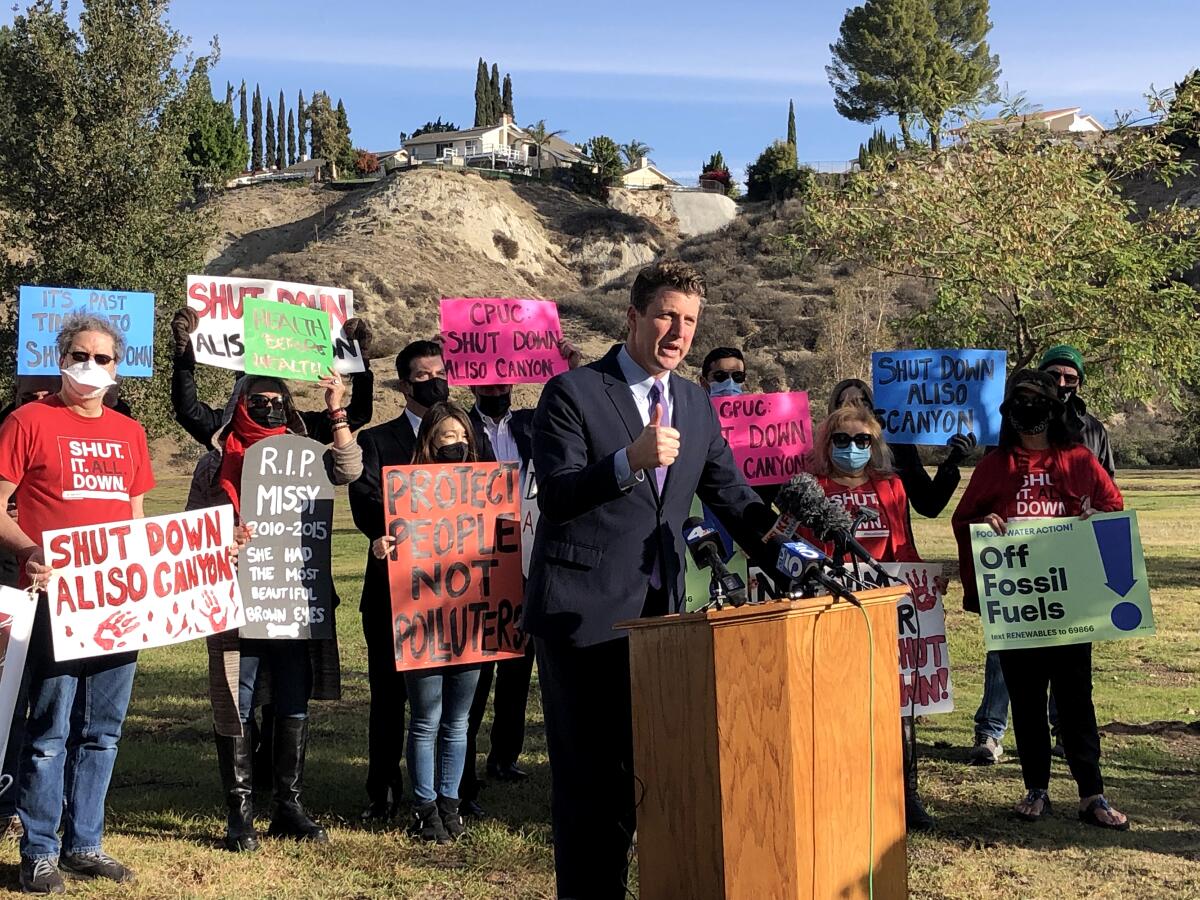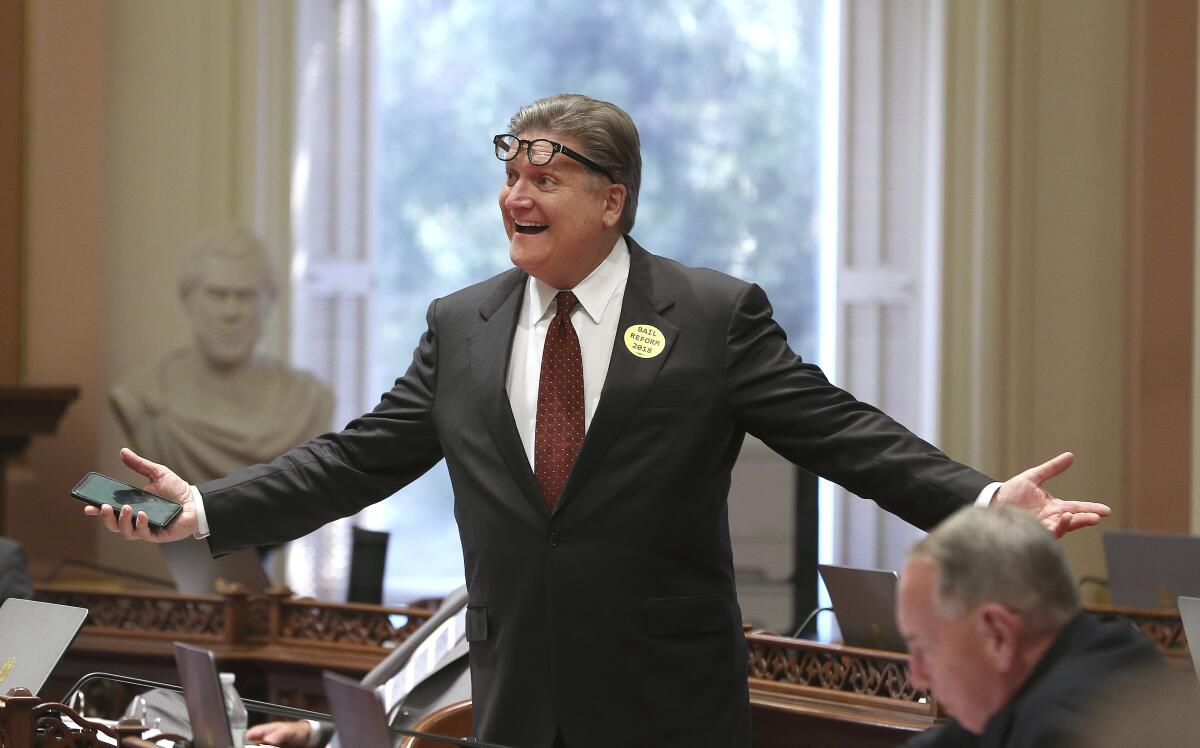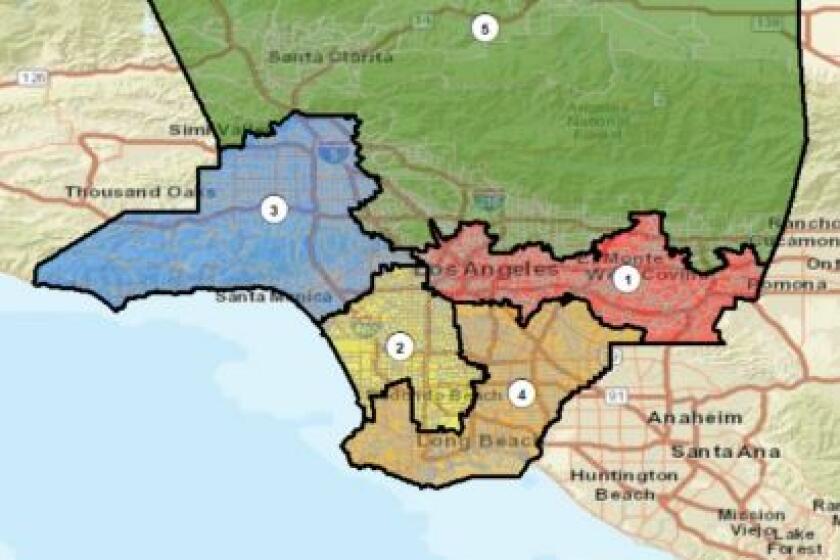Millennials vs. boomer. Who will succeed L.A. County Supervisor Sheila Kuehl?

- Share via
After Sheila Kuehl announced she was not seeking reelection to the L.A. County Board of Supervisors, the political maneuvering began.
The jockeying for the open seat intensified after district lines were redrawn in December in a once-in-a-decade process, bringing some conservative-leaning parts of the San Fernando Valley into Kuehl’s 3rd District.
That set the stage for Bob Hertzberg (D-Van Nuys) and Henry Stern (D-Malibu), state senators who represent parts of the Valley, to mount campaigns.
They are running against West Hollywood City Council Member Lindsey Horvath, who is backed by Kuehl, and three other candidates in a race where homelessness and crime have emerged as defining issues before the June 7 primary.
The supervisors are sometimes referred to as the “five little kings” because of their unglamorous but powerful jobs controlling an annual budget of nearly $39 billion in a county of more than 10 million people.
In the redistricting, which was led for the first time by a citizens commission instead of the supervisors themselves, the 3rd District lost some world-renowned cultural venues, including the Hollywood Bowl and the L.A. County Museum of Art.
It now includes much of the San Fernando Valley while retaining liberal bastions such as Santa Monica and West Hollywood and stretching along the coast to Malibu.
Kuehl was angered by the changes, saying in emails to constituents that they were meant to make the district more centrist and “a much easier district for a man who’s been salivating to run for the office but found himself in need of an electorate more closely tailored to his politics.”

She did not name the male politician.
The 1st District seat, which includes much of East Los Angeles and the San Gabriel Valley, is also on the June 7 ballot.
Hilda Solis, a former U.S. Labor secretary who represented the district since 2014, is running against four challengers. An incumbent supervisor has not lost reelection since 1980.
With Hacienda Heights, Rowland Heights and Diamond Bar joining the majority Asian cities of Monterey Park and Rosemead, the newly configured 1st District is almost 27% Asian.
The map prompted a sharp rebuke from 3rd District Supervisor Sheila Kuehl, who accused some politicians eyeing a seat on the board of influencing the commissioners.
About 52% of voters in the 1st District are Latino, down from 62%.
The 3rd District is now about 43% white, 37% Latino, 12% Asian and 4% Black.
The race between Hertzberg, Horvath and Stern — all Democrats — in the 3rd District should be highly competitive, said Raphael Sonenshein, executive director of the Pat Brown Institute for Public Affairs at Cal State L.A.
“You got three candidates with pretty well-defined constituencies and strong records and significant support and endorsements,” Sonenshein said.
The three have been closely matched in financial resources, with each raising about $800,000 through April 23, according to campaign finance filings.
A political action committee, the Alliance to End Homelessness, had raised $115,000 in support of Hertzberg’s candidacy through April 23.
Neighbors for Lindsey Horvath for Supervisor 2022 raised about $76,000 in the same period, and a Service Employees International Union committee supporting Stern raised about $58,000.
Stern’s supporters include the Los Angeles teachers union and SEIU Local 721, in addition to several Democratic clubs and state senators Ben Allen (D-Santa Monica), María Elena Durazo (D-Los Angeles) and Connie Leyva (D-Chino).
Besides Kuehl, other politicians endorsing Horvath include 4th District Supervisor Janice Hahn, Solis and Los Angeles Mayor Eric Garcetti.
Hertzberg’s endorsements include three members of Congress, Lt. Gov. Eleni Kounalakis, Assembly Speaker Anthony Rendon (D-Lakewood), 5th District Supervisor Kathryn Barger and the Assn. for Los Angeles Deputy Sheriffs.
Rendon has also endorsed Horvath.
The other 3rd District candidates — small-business owner Jeffi Girgenti, canine recreational provider Craig Brill and business owner and actress Roxanne Beckford Hoge — do not have political experience, and none had raised more than $30,000 as of April 23.
As of April 23, Solis, a Democrat, had raised more than $730,000.

Solis’ opponents — Pomona entrepreneur Kevin Dalton, West Covina businesswoman Tammy Solis and Azusa resident Brian Smith — each raised less than $5,000, except for La Puente City Councilman David Argudo, who loaned himself about $46,000.
Solis, who was not available for an interview, has prioritized closing Men’s Central Jail in downtown Los Angeles, as well as “care-first” alternatives to incarceration. She recently co-authored a motion to create a “super agency” on homelessness.
Mail-in voting started May 9. If no candidate gets at least 50% in the primary, the top two advance to the Nov. 8 general election.
Hertzberg, 67, served in the state Assembly from 1996 to 2002, including more than two years as speaker. After terming out of the Assembly, he finished third in the Los Angeles mayor’s race in 2005, then was elected to the state Senate in 2014, representing an east San Fernando Valley district.
He touts the funding he helped secure for crime labs to process DNA tests and rape kits, along with a $1.2-billion expansion to California’s Cal Grant financial aid program during his time leading the Assembly.
But in Sacramento, Hertzberg was nicknamed “Huggy Bear” for his love of embraces that made some women uncomfortable. In 2018, three lawmakers accused him of initiating unwanted hugs, and he was reprimanded by the state Senate Rules Committee.
In a campaign mailer, Hertzberg called L.A. County “a mess” and said “nobody is taking responsibility.”
Law enforcement is “too militarized,” and “new methods” are needed to handle mental health calls, he said in an interview with The Times.
But he is not in favor of major cuts to the L.A. County Sheriff’s Department, which runs the nation’s largest county jail system and patrols unincorporated areas and contract cities such as Compton.
“Defunding the police is the dumbest statement in the world,” he said.
He said the supervisors, who oversee the Sheriff’s Department’s budget, need to improve their antagonistic relationship with Sheriff Alex Villanueva, who is up for reelection.
On creating housing for homeless people, Hertzberg said the biggest stumbling blocks are “finger pointing” and lack of leadership.
“It’s really just someone taking responsibility and saying, ‘Let’s get this done,’” he said.
Horvath, 39, has served on the West Hollywood City Council, including stints as mayor, since 2015 after two years as an appointed member.
Recently, she advocated for the opening of a 40-unit West Hollywood apartment complex for struggling performers and pushed for more COVID-19 relief funding and expanding outdoor dining.
In November, the West Hollywood City Council voted unanimously to raise the minimum wage for hotel workers to $17.64 per hour, the highest in the nation, with other workers eventually to follow.

In an interview with The Times, Horvath did not take a position on a proposal to cut the West Hollywood sheriff’s budget by $3.2 million and redirect the money to homeless services.
The city, which contracts with the Sheriff’s Department for law enforcement, would have 10 fewer deputies under the proposal by Public Safety Commissioner Nika Soon-Shiong, daughter of Los Angeles Times owner Patrick Soon-Shiong.
The City Council is expected to vote on the proposal in the next few months.
“We certainly knew how to defund mental health services, and we’ve never refunded them,” said Horvath, an advertising executive who appointed Soon-Shiong to the commission.
“Public safety has to be our No. 1 priority,” Horvath added.
West Hollywood, where 20% of all new units are priced for low- to medium-income families, can be a model for the county on housing affordability, she said.
“We can look in all of our neighborhoods to see the impacts of the housing crisis, the homelessness crisis, the affordability crisis, and where they all intersect,” Horvath said. “In my community, we’ve taken it head on.”
An environmental attorney, the 40-year-old Stern was elected to the state Senate in 2016, representing Thousand Oaks, Calabasas, Simi Valley and western parts of the San Fernando Valley.
Stern’s Senate district includes Porter Ranch and surrounding communities, where residents were sickened and driven from their homes by a massive methane leak at the Aliso Canyon gas facility.
Stern has pushed for answers on why it took so long to close the facility and recently introduced a bill to shut it down by 2027.
A lot of Democrats “took the bait” in voting for Villanueva, and the supervisors must continue to play a strong role in overseeing the Sheriff’s Department, Stern said.
He expressed sympathy for sheriff’s deputies, saying they “have a target on their back.” He called for mental health care, peer support and training for first responders to address post-traumatic stress disorder and other issues.
Stern has introduced a bill in the state Senate that would create a right to mental health care and housing for homeless people.
More to Read
Sign up for Essential California
The most important California stories and recommendations in your inbox every morning.
You may occasionally receive promotional content from the Los Angeles Times.













